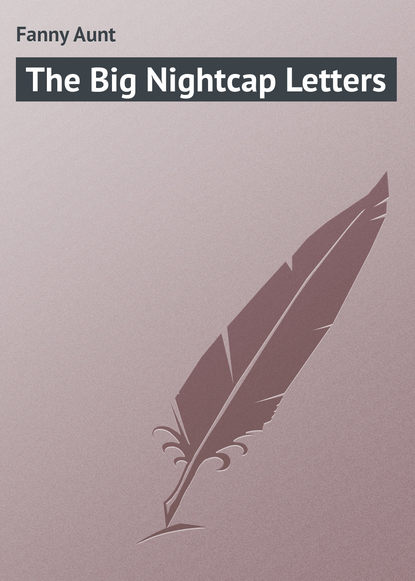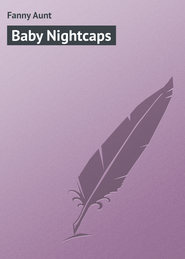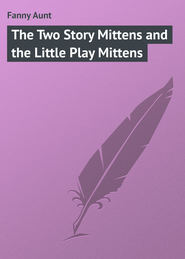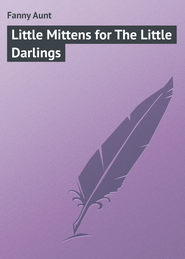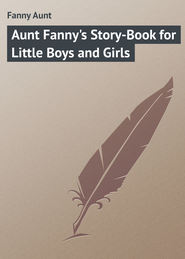По всем вопросам обращайтесь на: info@litportal.ru
(©) 2003-2024.
✖
The Big Nightcap Letters
Настройки чтения
Размер шрифта
Высота строк
Поля
"All eyes were turned to the door, when presently, in rushed Carl, breathless. In his hands, held up lovingly against his neck, was a poor little snow-white dove. Some crimson drops upon the downy breast, showed that it was wounded.
"'Oh! master!' cried Carl, 'I was looking for something bright, when I came upon this poor little white dove. A cruel hawk had wounded it, and I caught it quickly, and ran here. Oh! I fear it will die!'
"Even as he spoke, the dove's soft eyes grew filmy; it nestled closer in Carl's neck, gave a faint cry, and died.
"Carl sank on his knees beside the master's desk, and from his eyes there fell upon the white dove's poor broken wing, two tears, large and bright.
"The master took the poor dead dove from his hands, and laid it tenderly down on the desk with the bright things; then raising Carl, he softly said —
"'My children, there is no brighter gem on earth, than a tender, pitying tear.'
"The boys were silent for a moment, for they felt that the master had decided that Carl had rightly won the angel, and then Kline cried out —
"'Nay, master, thou didst not fairly explain to us. I pray thee give us yet another trial.'
"'Yes, dear master,' said Max 'give us one more trial.'
"'What sayest thou Carl?' said Master Friedrich.
"'Yes, dear master,' answered the generous boy.
"The good master smiled thoughtfully, and his eyes rested for a moment, lovingly, upon Carl; then glancing round, he said – 'He who brings me the loveliest thing on earth to-morrow, shall have the angel.'
"The children clapped their hands, and departed satisfied.
"After school, the next day, Kline was the first to run up to Master Friedrich, and lay upon his desk what he considered the loveliest thing in the whole world – his new soldier cap, with the long scarlet feather, and bright golden tassel. Max came next, and placed beside the cap a small silver watch, his last birthday gift, with a bright steel chain attached. Otto brought a great picture-book, just sent him by his godmother; Rudolph a tiny marble vase, richly sculptured; and so on, until a still more motley collection than before lay upon Master Friedrich's desk.
"Then little Carl stepped modestly up, and placed in the master's hand a pure white lily. The rich perfume filled the room; and bending over the flower, and inhaling the delicious fragrance, the master softly said – 'My children, the blessed Word of God says – Consider the lilies of the field, how they grow; they toil not, neither do they spin, and yet I say unto you, that even Solomon in all his glory was not arrayed like one of these. Carl has rightly chosen.'
"But murmurs arose; the children were not satisfied; and again they asked for another trial. And as before, good Master Friedrich inquired —
"'What sayest thou, Carl?' and he answered as before, with generous haste, 'Yes, dear master.'
"'Now this is the last time,' said the master. 'He who brings me the best thing on earth shall have the angel.'
"'The very best thing on earth is plum cake!' cried Kline, on the third day, as he walked up to the desk, bearing a large cake, richly frosted, with a wreath of sugar roses round the edge. This he placed triumphantly before the master, sure of the prize.
"'Nay, thou art wrong this time, Kline,' said Max. 'I asked my father what was the very best thing on earth, and he laughed, and gave me this golden guilder; the prize is mine.'
"'Ah! but my father said that the very best was a good glass of Rhenish wine,' cried Otto, 'and I have brought a bottle of it thirty years old; the prize is surely mine.'
"So they went on till all had placed their offering before the master.
"'And thou, Carl?' said he. 'What hast thou brought which thou thinkest the best on earth?'
"A crimson flush rose to the little boy's forehead, and coming softly forward, he took from his breast a small, worn Testament, pressed it to his lips, and then reverently laid it down with the rest as he said, in a sweet, low voice —
"'My mother, dear master, says that God's precious Testament is far before all other possessions.'
"''Tis thine, my Carl!' cried the master, snatching the boy to his breast. 'The white angel is thine! for there is nothing in the wide, wide world half so precious as the blessed words of Jesus;' and he placed the angel in the hands of the trembling boy.
"Kline knit his brows, and gazed with anger and disappointment at the little Carl; and the rest, seeing him do this, felt themselves aggrieved; but suddenly the cloud cleared from Kline's face, and rushing forward, he caught Carl in his arms, crying – 'Forgive me, dear Carl! now I am right glad thou hast won the prize!'
"Ah! the blessed effect of a bright example! Quickly joining hands, the children danced joyfully around the little Carl, who stood in the midst, the white angel pressed to his breast, his fair hair falling in curls on his shoulders, and his blue eyes full of holy tears.
"The good Master Friedrich also wept for joy, and prayed, from the depth of his pure and simple heart, that Jesus would bless this lesson to the children's everlasting good. He had turned away that none might perceive his tears.
"But One in heaven saw them, Master Friedrich."
The story was finished, but no one spoke, for the tears were softly falling from Charley's eyes; and the rest of the children, with quivering lips, were gazing in his face. At last he said, in a low voice – "What a lovely story! and how sweet and good little Carl was! Dear mamma! we will all try to be generous and good, as he was; and we all know what a precious book the Bible is. I love Carl; and I thank Aunt Fanny and Miss Sarah with all my heart, for writing this beautiful story about him."
And now all the children, with subdued and tender glances, kissed their dear mother and Charley, and went quietly to bed, thinking of the dear little Carl, and wishing softly to each other, that their mother had thought of asking them to find the "brightest and loveliest and best thing on earth," for they hoped they should have done just as the dear Carl did.
THE SECOND LETTER.
HEEDLESS HARRY
For Harry
Dear Harry: – I have happened upon an odd story of a heedless namesake of yours, and as you are a dear head-over-heels little fellow, I think you will be both amused and instructed by reading it; or at any rate, you will resolve never to cut any thing like the very extraordinary capers the other Harry did, either in the vegetable or travelling line. Once, when you were a very little fellow and were visiting at a cousin's house in the country, you busied yourself all one morning, pulling up radishes, eating the roots, and then setting the tops back in the earth, and when the gardener came to gather some for tea, he found them all wilted and flat to the ground. Do you remember how you had to run for it, when he caught sight of you laughing at him? and how his having the rheumatism in his knee, so that he could not move fast, was all that saved you from a good thrashing? I do. So here is the story, and hoping it will be very serviceable in helping you to "mend your ways," I am your loving
Aunt Fanny.
"HEEDLESS HARRY
"'Oh! how I do hate to write exercises!' exclaimed Harry, one Monday afternoon in the summer time; 'what's the use? they are abominable!' and he stamped his foot and threw down his pen, clapped his hat on his head, and rushed out of the front door.
"No wonder he was called 'heedless' Harry; for he was so thoughtless, that he never stopped one moment to reflect, when he set about doing any thing, whether or not it would get him into trouble; and consequently he was always in some scrape or other. He was old enough, certainly, to know better, and pleasant enough, in other respects, to be liked very much by all who knew him. He was full of fun, perfectly fearless, and bore an accidental scratch or tumble like a man. But, dear me! what a heedless, careless little scamp! That very morning, before school began, his mother had sent him into the garden to gather vegetables. He cut the carrots so that they would stand up on end, and with great onions began knocking them down, as if they were tenpins; then he had a game of jack-straws with some small slender beans, and ended the vegetable business by stringing a dozen red peppers and tying them round the cat's neck, making her sneeze her head nearly off; for the poor thing went 'tchitz! tchitz! tchitz!' for a quarter of an hour.
"When he was tired of laughing at her, he marched away to skip stones in the brook, and ended by slipping on the bank and tumbling into the water, and treating himself to a very thorough ducking.
"Harry lived with his parents on a large pleasant farm, about twenty miles from the city of New York. He had never been in New York; and this afternoon, at which my story commences, when he rushed to the front door, he put his hand in his pockets and said to himself: 'I've a great mind to run away! I know I shall catch it to-morrow, about that old exercise, and I can't write it. I won't! now!'
"He walked to the fence, and climbing up, looked over into a neighbor's meadow.
"A beautiful white horse was quietly grazing, and lazily switching the flies off his back with his long and silken tail.
"'Halloo!' exclaimed heedless Harry, 'there's Lightfoot! Jolly! what a chance to go off on my travels! I'll catch him. There! now he is drinking out of the brook. I'll go and jump on his back.'
"As usual, the little scapegrace had entirely forgotten that the horse was very swift and spirited, and also that he did not belong to him or his parents. So Harry, with one bound, jumped the fence, paying no kind of attention to a great thorn which tore down the leg of his pantaloons for half a yard, ran up to Lightfoot, caught him with one hand by his flowing mane, placed the other on his back, and tried to mount him.
"Horses are animals, but they are not stupid or fools for all that. So Lightfoot, while he kept his nose in the brook, had been quietly watching Harry out of the corner of his eye; and when the young gentleman tried to jump on his back, the horse gave a quick little start to one side, and a knowing flourish with his tail, which sent Mr. Harry plump into the brook for the second time that day, and then Lightfoot scampered off with a neigh which sounded remarkably like a horse laugh.
"The angry boy scrambled up the low bank like a lame grasshopper, and screamed out, 'You hateful old thing! I will get on your back! see if I don't!' So he cut a stout branch from a tree, stripped it, made it whistle through the air, and with a spiteful chuckle advanced once more upon Lightfoot.
"The horse gave another neigh. Harry approached him softly, hiding the whip behind him, smoothed his neck, and patted his side, and then, with a sudden spring, leaped upon his back.
"Lightfoot stood perfectly still. Then Harry clucked his tongue against his palate to coax him to go.





